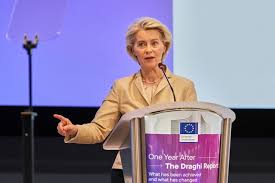News Flash
News Flash

UNITED NATIONS, United States, Sept 24, 2025 (BSS/AFP) - EU chief Ursula von
der Leyen on Wednesday threw her support behind growing calls to ban social
media use for children, promising to weigh action at the European level in
coming months.
"Many member states believe the time has come for a 'digital majority age'
for access to social media," the European Commission head told an event on
the sidelines of the UN General Assembly.
"I must tell you as a mother of seven children, and grandmother of five, I
share their view," she told the gathering in New York.
Von der Leyen was speaking alongside Australian Prime Minister Anthony
Albanese, whose country is at the forefront of global efforts to curb
internet harms -- with its social media ban on under-16s a world-first.
"We all agree that young people should reach a certain age before they smoke,
drink, or have access to adult content," she said. "The same can be said for
social media."
Von der Leyen said she would establish a panel of experts and talk to
parents, teachers and young people "to assess what steps make sense" at the
EU level.
The 27-nation bloc has some of the world's strictest rules to fight harmful
content online, with several investigations looking into how the biggest
social media platforms protect children -- or not.
France, Greece and Spain are among several EU states pushing for restrictions
on minors' access to online platforms.
They proposed earlier this year setting an age of digital adulthood across
the bloc, but Brussels initially appeared lukewarm.
Von der Leyen's commission said at the time such a move would be for each
member state to decide, rather than be imposed by the union's executive arm.
Social media companies including Facebook and Instagram owner Meta have
expressed concerns about Australia's law.
- French pressure -
Denmark, which holds the six-month rotating EU presidency, has made the issue
a priority and vowed to push the bloc to do more.
France has also driven the issue to the top of the agenda, having already
passed a 2023 law requiring parental consent for social media users under the
age of 15, higher than the 13=year-old limit set by the platforms themselves.
French lawmakers have gone further in calling for a "digital curfew" for
older minors, for example, between 10 pm and 8 am for 15 to 18-year-olds.
They have focused particularly on concerns about TikTok -- owned by China-
based ByteDance -- including content encouraging self harm.
France is also one of five EU countries testing an app aimed at preventing
children from accessing harmful content online by checking users' ages.
Denmark, France, Greece, Italy and Spain will customise a prototype of an
age-verification app to launch national versions within several months.